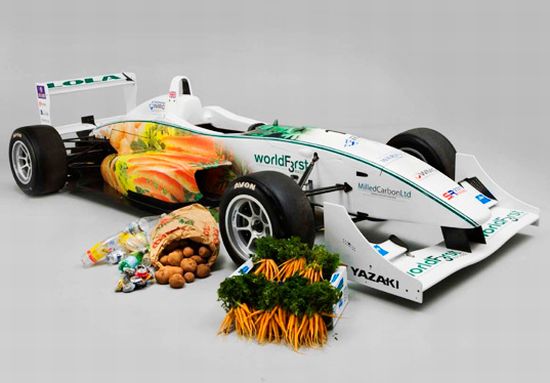Sustainable chemistry, renewable polymers and materials
In recent years we have developed chemistry to take renewable chemicals or waste streams and chemically manipulate them in a green manner to make feedstocks that are suitable for polymer synthesis. We have focussed on the use of vegetable oils, flavanoid, glycerol derivatives and aromatic molecules derived from the degradation of lignin.
We have been able to prepare a range of cross-linked thermoset polyurethanes as well as a range of elastomeric polyethers, polyurethanes and polyesters. We have applied our chemistry to make polymethacrylate and polystyrene derivatives from renewable feedstocks and to design novel polymers with anti-oxidant activity. We have extended our chemistry to the synthesis of natural composites and our materials have been used in demonstrators such as the sustainable F3 car, the eco-car and the eco-surfboard. We are currently extending the use of renewable feedstocks in the surface coating industry, both in the paint and specialised coatings sector.
The eco-car has appeared at the Eden Project, the Science Museum in Kensington, the Top Gear website and at the Coventry Motor Museum. We prepared the fuel for the F3 WorldFirst Racing car. We have been awarded over £1M of research grants to investigate these areas (Adaptive Processing of Natural Feedtsocks: EPSRC EP/F015321/1 (£475,878); Wealth out of Waste: Warwick Innovative Manufacturing Research Centre (£324,000); Akzo-Nobel £60,000; Coopers Coated Coil £150,000. We are working closely with Boots, Croda, Akzo Nobel and CI-KTN to exploit this research. We given lecture tours of New Zealand and the US on these topics and recently gave a keynote lecture in the Romanian Chimia 2012 conference at Constanta.
Key recent papers:
Novel polymers from plant oils Polymer Chemistry, 2014, 5, 3238
Biorefining paper Compte Rendus Chimie, 2014, 17, 2324,
Sustainable motor racing (Kerry Kirwan)
An historical perspective of our recent chemistry
Specific research areas:
Aromatic feedstocks from lignin
Renewable polyurethane and polyethers
Recent published papers in this area
- Production of novel chemicals from lignocellulosic wastes. Costs estimation. C. I. Koncsag, S. R. Coles, A. J. Clark and K. Kirwan, Bioresource Tech. 2012, submitted.
- Extracting valuable compounds from straw degraded by pleurotus ostreatus. C. I. Koncsag, A. J. Clark, D. Easton, S. R. Coles, A. E. Collis, K Kirwan, Resources, Conservation and Recycling, 2012, 58, 14-22.
- A design of experiments (DoE) approach to material properties optimisation of electrospun nanofibres. S. R. Coles, D. K. Jacobs, G. Barker, A. J. Clark, K. Kirwan, J. App. Pol. Sci., 2010, 2251.
- Degradation studies of polyurethanes based on vegetable oils. Part 1.Photodegradation, A. Z. Mohd Rus, T. J. Kemp, A. J. Clark, Progress in Reaction Kinetics and Mechanism, 2008, 33, 363.
- Degradation studies of polyurethanes based on vegetable oils. Part 2. Thermal degradation and materials properties, A. Z. Mohd Rus, T. J. Kemp, A. J. Clark, Progress in Reaction Kinetics and Mechanism, 2009, 34, 1-41.
- Synthetic Mimicking of Plant Oils and Comparison with Naturally Grown Products in Polyurethane Synthesis, S. R. Coles, G. Barker, A. J. Clark, K. Kirwan, D. Jacobs, K. Makenji, D. Pink, Macromol. Biosci. 2008, 8, 526.
- Mechanical Properties of Hemp Fibre Reinforced Euphorbia Composites. A. J. Clark, N. J. Tucker, L. Mwaikambo. MacroMol. Mat. Engin. 2007, 292, 993-1000.
- Characterisation using MALDI and Chemical Manipulation of Euphorbia Oil Towards Polymer Feedstocks, A J Clark, in “The Development of Euphorbia Lagascae within the European Community (FAIR CT98/4460)”, Eds D. Turley, M. Fremont and S. Cook, ADAS, 2000, 52-57.
- New Feedstocks for Polyurethane Synthesis. J. A. Sherringham, A. J. Clark, B. R. T. Keene. Lipid Technology 2000, 129-130.
Information on the sustainable F3 car.

![]() Video: mp4. Dr. Andrew Clark discusses sustainability with Dr. Kerry Kirwan.
Video: mp4. Dr. Andrew Clark discusses sustainability with Dr. Kerry Kirwan.

![]() Audio: mp3 Dr. Andrew Clark discusses sustainabiliy on Mars and the Moon.
Audio: mp3 Dr. Andrew Clark discusses sustainabiliy on Mars and the Moon.
![]() Plastic and rubber Weekly article
Plastic and rubber Weekly article
Collaborators
Prof. Alexei Lapkin
Prof. David Haddleton
Prof. Rachel O'Reilly
Prof. Timothy Bugg
Prof. Terry Kemp
Dr. Kerry Kirwan
Dr. Stuart Coles
Dr. Stefan Bon
Sponsors
Akzo-Nobel
Cooper Coated Coil
EPSRC
